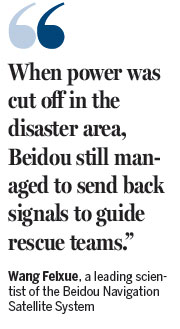|
Scientists at the center prepare for the launch of the first satellite of the Beidou global system in January. Photos provided to China Daily |
In late 2007, a second-generation Beidou satellite lost contact with its control center due to complicated electromagnetic interference. If the problem remained unresolved for more than three months, it would not only turn the satellite into "space junk" but also delay the launch of subsequent satellites.
Industry experts came up with two solutions. The first involved changing to another signal frequency to avoid the interference, while the second required installing stronger anti-interference shields.
"It is technically easy to implement the first method, but changing the signal frequency means the waste of previously launched satellites and the potential for future interference," Wang said.
At such a critical juncture, tremendous pressure fell on Wang and his team to come up with the remedy. After three months of sleepless nights, he once again succeeded in tackling the problem by enhancing the anti-interference capability a thousandfold.
"As one of the Beidou system's leading scientists, Wang spends on average 200 days each year on business trips and at testing grounds. His hardworking spirit has inspired every member on the Beidou team," Ou said.
China is the third country to develop its own satellite navigation system, following the United States' GPS and Russia's GLONASS. It began providing positioning, navigation, timing and short messaging services to civilian users in China and neighboring countries in the Asia-Pacific region toward the end of 2012.
Ran Chengqi, director of the China Satellite Navigation Office, which oversees the Beidou project, said China is cooperating on satellite navigation with surrounding countries, such as Australia, Indonesia, Pakistan and Singapore.
"We are helping some countries in Southeast and Southern Asia plan for their ground applications of the Beidou system and are building infrastructure so they can better use the system," Ran said.
According to Wang, the next challenge for Beidou is to integrate into the large civilian market, while striving to achieve new technical advances to the system, such as real-time and high-precision positioning technology.
"Competition at the level of civilian use is fierce," Wang said. "GPS has already taken up a large proportion of the market. A country will have to rely on its strong industrial capability to compete in this application area.
"Fortunately, China has a strong industrial system. We are working closely with microchip providers like Huawei to further integrate communication and navigation. Hopefully, we will enter the civilian market within a year or two."
Zhao Lei contributed to the story.
puzhendong@chinadaily.com.cn

